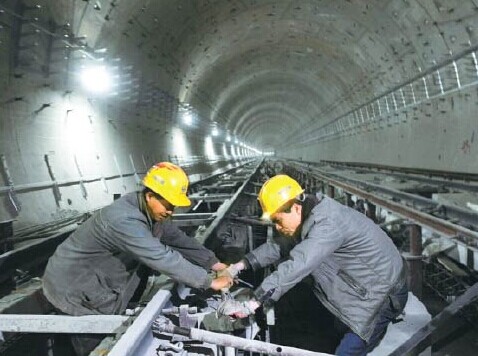

A construction crew works on Beijing's Metro Line 14 subway rail. Beijing MTR Co will start operating the second phase of the subway line in the second half of this year.CHINA DAILY
MTR Corp, the operator of Hong Kong's metro system, is hoping to gain more concessions in the mainland as part of the central government's practice to encourage the public-private partnership business model to diversify economic structure and improve public services.
Beijing MTR Co, an MTR joint venture in the mainland, will start operating the second phase of Beijing's Metro Line 14 in the second half of this year. The concession lasts 30 years, and MTR will invest 2.2 billion yuan ($355.2 million) on metro trains, vehicle maintenance and operational facilities.
Unlike metro operators in the mainland and other parts of the world, MTR has a wide business portfolio, including residential and commercial development project, property leasing and management, advertising, telecommunications and international consultancy services, in addition to its railway operations.
Raymond Chien, MTR's chairman, said bringing expertise in railway development and property management to the mainland is a core component of the company's strategy for continued growth.
"Because Shenzhen is closer to Hong Kong and has favorable policies to support foreign investment compared with other parts of the country, we will focus on developing our business in this city and also in fast-growing cities like Beijing, Hangzhou and Tianjin, as well as explore opportunities in the western parts of China," Chien said.
MTR runs four metro lines in Beijing, Shenzhen and Hangzhou, as well as two property development projects in Tianjin and Shenzhen. The company's operating profit in the mainland and overseas markets amounted to HK$791 million ($102.06 million) in 2013, up 31 percent from a year earlier. One of the reforms the central government has adopted in the new stage of its social economic development is to encourage the practice of the public-private partnership model as part of its financial reform to create more new market growth points. Chien said it is extremely helpful for metro operators and helps to reduce costs in the mainland.
The public-private partnership model is where a government service or private business venture is funded and operated through a partnership of government and one or more companies from private sector.
Leong Kwok-kuen, deputy chief executive officer of MTR, said more cities in the mainland have realized that this model can enable local governments to use the expertise and efficiency private companies can offer to the delivery of certain metro facilities and services traditionally provided and operated by the government.
The National Development and Reform Commission so far has approved 37 applications for rail transportation construction projects in the past six years, and 19 cities had metro systems by the end of 2013.
Even though building and enlarging the metro network will improve China's urbanization process, it is quite expensive to sustain these lines.
In second-tier cities, for example, governments have to spend between 3 billion and 6 billion yuan ($484.3 million to $968.51million) to subsidize their metro systems because of low fares, high maintenance and operating costs, according to a report by the institute of transportation research of NDRC released in March.
MTR won the bid for a site at Beiyunhe station along Tianjin Metro Line 6 through a joint venture with Tianjin Metro Group Co in 2013. A mixed-use development of 270,000 square meters will be sold at the Tianjin site in 2015.
"The Chinese mainland has abundant purchasing power and a growing middle class, so carrying out 'the rail plus property' business model certainly can benefit the traveling public because the cost of building railways is shared by the profit generated from property sales," said Hou Hanping, a professor of public transportation at Beijing Jiaotong University.
"Fares can be kept at reasonable levels, without the need for government subsidies on day-to-day operations, "Hou said.
Copyright ©1999-2018
Chinanews.com. All rights reserved.
Reproduction in whole or in part without permission is prohibited.